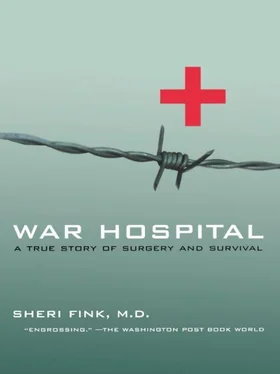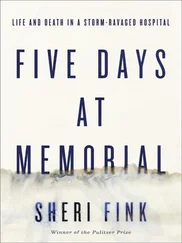The UNPROFOR soldiers referred to military activity in the matterof-fact language meteorologists use to give weather reports. Eric’s group was in luck. Today’s weather was “calm.” A small U.N. military convoy was about to leave for Sarajevo, and, rather than integrating MSF into the convoy, its leader grudgingly authorized Eric’s car to follow at his own risk. They made it into the city with little incident, and the local MSF staff members greeted them in good spirits. Together, they sped to the hospital along streets crackling with sniper fire, ducking on reflex when the shooting sounded close. Eric sneaked glances at the proud former Olympic city he’d visited numerous times before the war. Its delicate Austro-Hungarian buildings were splattered with shell craters, its twin modern skyscrapers had been burnt in a rocket barrage.
After delivering supplies to the hospital and making their assessments, Eric’s team returned to the dangerous streets, racing toward the apartment of an MSF worker to stay the night. The car ahead of them stalled for a terrifying moment at an exposed crossroads and Eric’s own driver, a local hero for delivering drugs throughout the besieged city, took the risk of slowing down and nudging it to safety from behind. Inside the ugly high-rise block apartment, Eric listened as the shelling of the city intensified. He stepped out on the balcony and gazed at the city and the mountains that rose on its northern side. Before his very eyes, grenades slammed into houses, exploding with flashes of fire.
Maybe people are dying there. Maybe whole families.
He turned to his host.
“What if the Serbs start shelling this building?”
“We’re all dead,” the young man answered.
Eric’s infected throat felt as raw as if live birds were pecking it. Exhausted, he lay down and, in spite of the continuous pain and the continual thunderclaps of shelling, he managed a fitful night’s sleep. The morning of their departure, Eric and his colleagues reported to the sandbagged main Sarajevo post office, now headquarters to a small contingent of U.N. Protection Force soldiers, and prepared for the drive back to Belgrade. Eric strapped on a bulletproof vest offered by U.N. soldiers. The day was sunny and quiet, aside from remote bursts of gunfire. Eric sat down in the back seat of the Toyota Land Cruiser, and the MSF administrator started the engine. They joined a convoy of armored U.N. vehicles and rolled slowly out of the city along a deserted road bordered by dismembered buildings.
Everyone fell silent as the group began to cross the wide-open tarmac of an abandoned airport. The engine hummed. Then, with a metallic bang, a bullet hit the car. Sniper.
Eric hit the ground—as best he could. He folded his lanky body as tightly as possible behind the front seat of the car and squinted up at the windshield. He watched as the U.N. “Blue Helmet” at the machine-gun of the tank ahead of him withdrew into the turret and closed the hatch. Eric’s vehicle was smack in the middle of a runway with a long way to go before reaching cover. He was sure that the sniper was adjusting his aim.
Then a second bullet hit, shattering both side windows. Eric ducked. He had to protect his head. A bullet in the thigh, that would be OK, that would heal. But not the head. Fear ran through him like a cold, metallic liquid. He felt pinpricks of pain from splinters of glass on his exposed skin.
The driver drove blindly, lying flat on the front seat holding on to the wheel. Eric peeked up between the seats, trying to guide him, trying to estimate the location of the sniper so he could direct the car beside one of the armored vehicles for protection. The Toyota drew dangerously close to the back of the armored vehicle in front of them.
“Slow down!” Eric shouted through his sore throat, and the driver hit the brakes. Then a third bullet cracked the dashboard. Eric contracted into a ball, muscles tetanized by fear. He awaited the next shot.
Somebody who doesn’t know me, who never saw me, is trying to kill me , he thought. He hates me without reason, without knowing me .
Seconds passed. He felt the car inch forward, then turn. Eric opened his eyes. They were on a small road now, hidden behind trees. He straightened himself out and sat up.
“Everything OK, guys?” he asked. The people in the car took a moment to inspect one another. Except for a few bloody surface wounds, everyone was all right. They realized with relief that they’d more or less escaped the crisis and laughed nervously.
The U.N. soldiers had not returned fire. It was the first time Eric saw firsthand how wary they were of confrontation. The convoy continued back to Lukavica where Serb soldiers, possibly the ones who’d just shot at them, greeted them warmly.
Back at the MSF office in Belgrade, coworkers slapped Eric on the back and called him “cowboy.” He didn’t feel like one. He knew he’d been scared stiff. He’d had, as the Belgians call it, “a blue fear.” The visceral experience only strengthened his opinion that humanitarian aid meant little in the face of deadly violence. Rather than providing aid, powerful countries should be pouring their efforts into stopping the war.
But that was exactly the opposite of what happened. Unwilling to go to war in Bosnia, but needing to convince their populations that something was being done to alleviate the suffering being shown on CNN, member states of the U.N. Security Council passed resolutions that punished Yugoslavia with sanctions and led the U.N. Protection Force, with great fanfare, to secure the Sarajevo airport for a massive airlift of humanitarian assistance. MSF co-founder Dr. Bernard Kouchner, serving as a French government minister, helped initiate the airlift. He favored stronger action against Serb forces, but conversations with French President François Mitterrand convinced him it wouldn’t be forthcoming. Kouchner believed that multinational, state-supported humanitarian intervention, while not enough, represented major progress compared with the usual lack of interest of states in helping the victims of somebody else’s war. The council called for a strengthening of the protection force and gave it an official mandate to work in Bosnia to protect humanitarian assistance delivered by the U.N. High Commissioner for Refugees and others.
The plan split the aid community. On the one hand, members of the International Committee of the Red Cross vehemently opposed what they considered a militarization of humanitarian aid, which could endanger humanitarian neutrality in the eyes of the combatants. Indeed, the May 22 agreement that had been initiated by the Red Cross and signed by the region’s military leaders emphasized “that humanitarian activities have to be kept absolutely separate from military operations.” In an article appearing the same month, a Red Cross leader wrote that the organization should not cooperate with efforts in which the military was involved in delivering aid. Aid delivery was protected by international law, he argued, and did not need protection from soldiers.
Even the U.N. High Commissioner for Refugees feared that large-scale international military intervention would be counterproductive, because any upsurge in fighting would interfere with humanitarian assistance efforts. So, while it had seemed, at first, that the United Nations would undertake a humanitarian enforcement operation similar to Operation Provide Comfort in Iraq, in the end, the U.N. Protection Force’s authorization to use force was watered down. Countries were reluctant and slow to send additional troops.
Sure, it had made Eric Dachy slightly uncomfortable to travel with a military escort into Sarajevo, but there didn’t seem to be another way. What bothered him much more was that the only thing the inaptly named U.N. Protection Force was mandated to protect was humanitarian aid and those who delivered it—not the actual victims of the war. An MSF France board member would later compare such a U.N. force to the colonial gunboats that “came to the rescue of worthy missionaries beset by natives.”
Читать дальше












